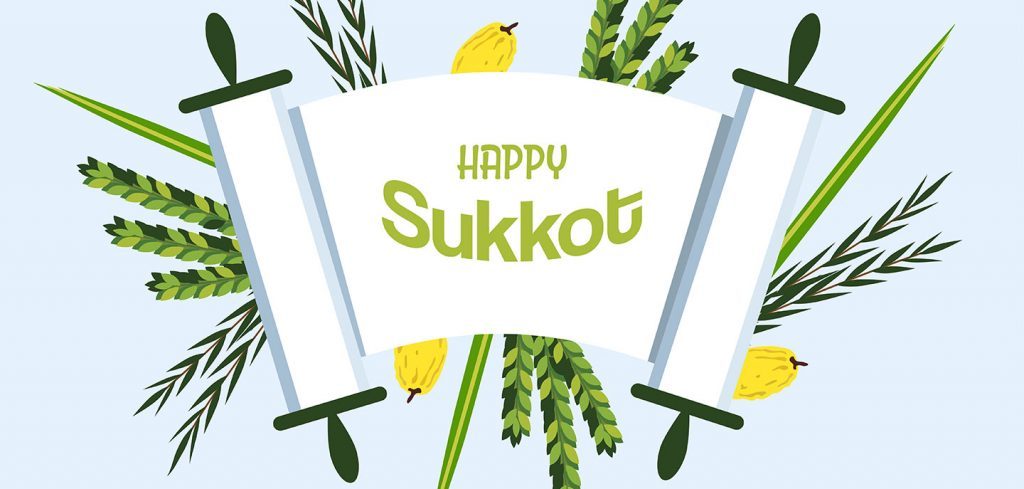This Year the Holiday of Sukkot, Shemini Atzeret and Simchat Torah begins Friday night September 29th at 6:27 pm (Philadelphia Time) – Ends on Sunday, October 8th after Nightfall 7:11 pm (Philadelphia Time)
(In honor of Sukkot, please print BEFORE the Holiday begins – This Document contains G-d’s Name, therefore it may NOT be thrown out)

As soon as the solemn day of Yom Kippur is behind us, we focus on the traditions of the upcoming joyous holiday of Sukkot. We build a temporary house called Sukkah, which reminds us of the Clouds of Glory with which G-d surrounded the Jewish people in the desert after the Exodus from Egypt.
It is very special to experience a meal in a Sukkah and to ‘shake’ The Four Species (Lulav, Etrog, Aravot and Hadassim). If you have never done either before, visit http://www.cbscommunitycenter.com You can also visit www.Chabad.org to find a synagogue near you where you can be accommodated.
Elevating the Mundane
When we do a mitzvah (a commandment), we elevate ourselves, the object with which we did the mitzvah, and our environment. Most commandments are focused only on limited aspects of our being and limited dimensions of our environment. However, when it comes to dwelling in a Sukkah, not only is the entire body enveloped by the mitzvah, but so are the most mundane aspects of life. After all, by eating, drinking or even reading a good book in the Sukkah, we perform a mitzvah that encompasses our entire body!
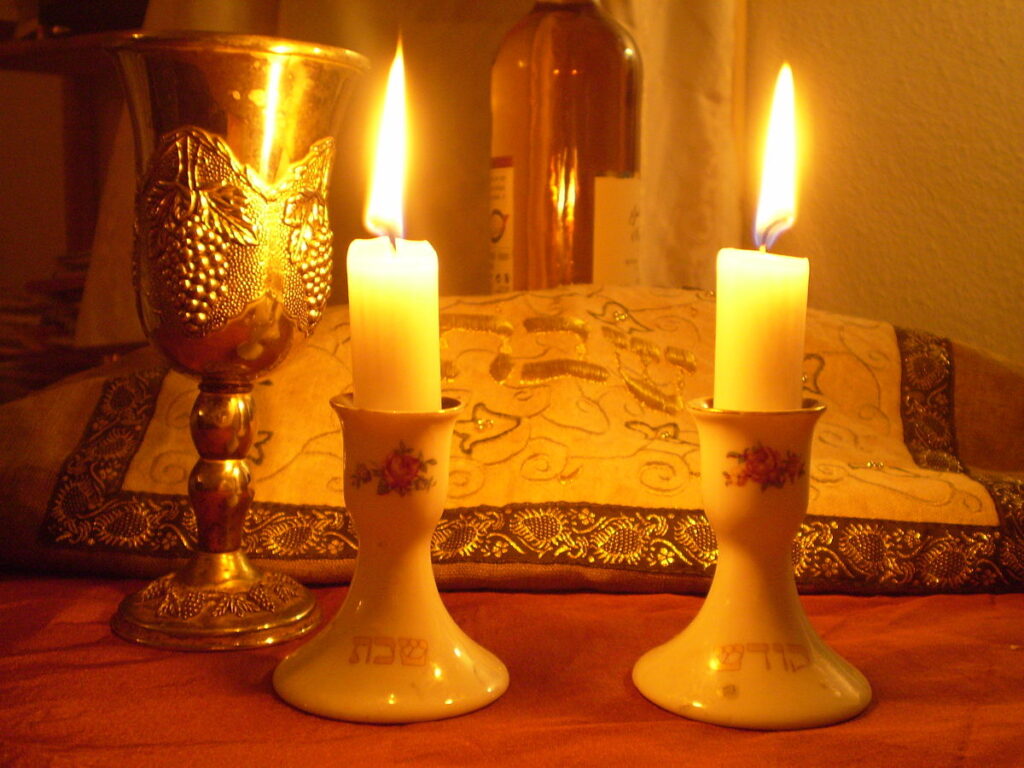
Women (or if there isn’t a woman in the house, the head of the household) lights candles.
Please light from existing fire of a candle you light prior to the Holiday.
For exact times in your area go to: http://www.chabad.org/calendar/candlelighting_cdo/aid/6226/jewish/Shabbat-Candle-Lighting-Times.htm
On Friday September 29th, 6:27 pm (Philadelphia Time) and
Friday, October 6th 6:16 pm (Philadelphia Time) say two prayers below:
1. Ba-ruch A-tah Ado-nai E-lo-hei-nu me-lech ha-olam asher ki-deshanu be-mitzvo-tav ve-tzvi-vanu Lehadlik Ner Shel Shaboth v Yom Tov
(Blessed are You, L-rd our G-d, King of the universe, who has sanctified us with His commandments and has commanded us to light the candle of Shabbath and the Holiday.
2 . Ba-ruch A-tah Ado-nai E-lo-hei-nu me-lech ha-olam she-heche-ya-nu ve-ki-yi-ma-nu ve-higi-a-nu liz-man ha-zeh
(Blessed are You, Lord our G-d, King of the universe, who has granted us life, sustained us, and enabled us to reach this occasion.)
On Saturday, September 29th (after 7:25 Philadelphia Time) and Saturday, October 7 after 7:14 pm (Philadelphia Time) say two prayers below:
Ba-ruch A-tah Ado-nai E-lo-hei-nu me-lech ha-olam asher ki-deshanu be-mitzvo-tav ve-tzvi-vanu Lehadlik Ner Shel Yom Tov
(Blessed are You, L-rd our G-d, King of the universe, who has sanctified us with His commandments and has commanded us to light the candle of the Holiday.
2 . Ba-ruch A-tah Ado-nai E-lo-hei-nu me-lech ha-olam she-heche-ya-nu ve-ki-yi-ma-nu ve-higi-a-nu liz-man ha-zeh
(Blessed are You, Lord our G-d, King of the universe, who has granted us life, sustained us, and enabled us to reach this occasion.)
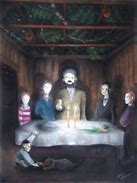
Evening Kiddush for both Friday and Saturday Nights
Evening Kiddush is recited while holding a cup of kosher wine or grape juice.
On Friday September 29th and October 6th, begin here:
And there was evening and there was morning, the sixth day. And the heaven and the earth were finished, and all their host. And on the seventh day God finished His work which He had done; and He rested on the seventh day from all His work which He had done. And God blessed the seventh day, and sanctified it; because He rested on it from all of His work which God created in doing (Genesis 1:31-2:3).
On Fridays and Saturdays, recite:
Blessed are You, Lord our God, King of the universe, who creates the fruit of the vine.
Blessed are You, Lord our God, King of the universe, who has chosen us from all peoples and has raised us above all tongues and has sanctified us with His commandments. And You have given us, Lord our God, [on Friday night add: Sabbaths for rest], appointed times for happiness, holidays and special times for joy, [on Friday night add: this Sabbath day, and] this Festival of Sukkot, our season of Happiness [on Friday night add: in love] a holy convocation in memory of the Exodus from Egypt. For You have chosen us and sanctified us above all peoples. You granted us [on Friday night add: Sabbath, and] your holy times [on Friday night add: with love and graciousness] with happiness and with joy.
Blessed are You, O Lord, who sanctifies [on Friday night add: the Sabbath,] Israel, and the appointed times.
On Saturday nights September 30th and October7th add the following two paragraphs:
Blessed are You, Lord our God, King of the universe, who creates the light of the fire.
Blessed are You, Lord our God, King of the universe, who distinguishes between the holy and the profane, between light and darkness, between Israel and the nations, between the seventh day and the six working days. You have distinguished between the holiness of the Sabbath and the holiness of the Festival, and You have sanctified the seventh day above the six working days. You have distinguished and sanctified Your people Israel with Your holiness.
Blessed are You, O Lord, who distinguishes between the holy and the holy.
On Fridays and Saturdays, recite:
Blessed are You, Lord our God, King of the universe, who has granted us life and sustenance and permitted us to reach this season.
Blessed are You, Lord our G-d, King of the universe, who has sanctified us with His commandments, and commanded us to sit in the Sukkah.
(Pour some wine into a separate cup for guests and then drink the rest yourself without talking.)
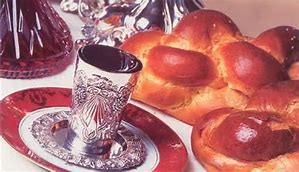
Challah in Honey
Immediately following the kiddush, we perform the ritual washing for bread. Fill a large cup with water. Pass the cup to your left hand and pour three times over your right hand. Repeat by pouring on your left hand. As you wipe your hands recite the blessing:
Baruch atah A-donoy, Elo-heinu Melech Ha’Olam, asher kidshanu bemitzvotav vetzivanu al netilat yadayim.
When everyone has returned to the table, we raise the two challah loaves and recite the blessing:
Ba-ruch atah A-do-nay, E-lo-hei-nu Melech Ha-Olam, hamotzie le-chem min ha-are-tz.
Blessed are You, L-rd, our G-d, King of the universe, who brings forth bread from the earth.
Cut the challah, dip it in honey and salt, and have a bite. Pass around pieces and make sure everyone does the same
UNIQUE FEATURES OF SUKKOT
On Sukkot there is a special Mitzvah to dwell in special hut called a Sukkah. Therefore one should eat and if one is able to even sleep in this holy abode.
A Sukkah is a hut built to provide shade. That’s why it must sit beneath the open sky—not under a patio deck or even the branches of a tree. The walls can be made of any material, as long as they are secure and don’t flap about in the wind. The roof, however, (we call it s’chach), must be of unprocessed materials which have grown from the ground. Bamboo poles, thin wooden slats, and evergreen branches are popular choices. We make sure to use enough s’chach so that the inside of the sukkah has more shade than sunlight.
On Sukkot, along with the mitzvah of dwelling in the Sukkah comes the Scriptural obligation of “taking” the Four Species as instructed by the verse, “On the first day, you must take for yourself a fruit of the citron tree, an unopened palm frond, myrtle branches and willows of the brook.”
We SHAKE the Four species on all days of Sukkot except for Shabbat, September 30th. Last time to shake is before Sunset on October 6th
The Four Species are co-dependent, and if one of the four is missing, the mitzvah is not fulfilled. In total, seven individual items are required for the mitzvah:
1. One Lulav
2. One Etrog
3. Two Aravot
4. Three Hadassim
Why are these four plants used instead of other plants? There are two primary explanations of the symbolic significance of these plants: that they represent different parts of the body, or that they represent different kinds of Jews.
According to the first interpretation, the long straight palm branch represents the spine. The myrtle leaf, which is a small oval, represents the eye. The willow leaf, a long oval, represents the mouth, and the Etrog fruit represents the heart.
All of these parts have the potential to be used for sin, but should join together in the performance of commandments and bring Divine Light into the world.
According to the second interpretation, the Etrog, which has both a pleasing taste and a pleasing scent, represents Jews who have achieved both knowledge of Torah and performance of mitzvot (commandments). The palm branch, which produces tasty fruit, but has no scent, represents Jews who have knowledge of Torah but are lacking in mitzvot. The myrtle leaf, which has a strong scent but no taste, represents Jews who perform mitzvot but have little knowledge of Torah. The willow, which has neither taste nor scent, represents Jews who have no knowledge of Torah and do not perform the mitzvot.
We bring all four of these species together on Sukkot to remind us that every one of these four kinds of Jews is important, and that we must all be unit
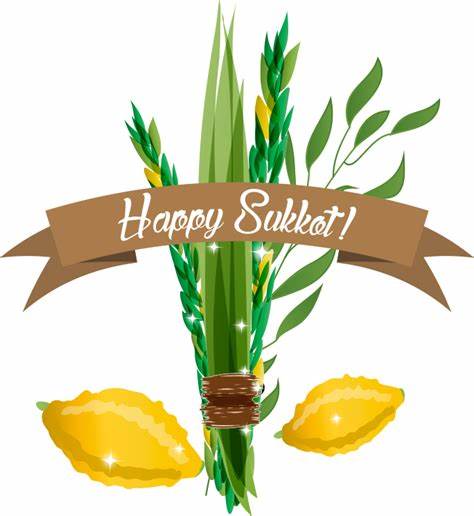
The Blessing for the Four Species
Take the etrog in your left hand with the stem (green tip) up and the pitam (brown tip) down. Take the lulav (including the palm, myrtle and willow branches bound together) in your right hand. Bring your hands together and recite the blessing below.
Barukh atah A-do-nai, Eloheinu, melekh ha-olam asher kidishanu b’mitz’votav v’tzivanu al n’tilat lulav (Amein)
Blessed are you, Lord, our God, sovereign of the universe Who has sanctified us with His commandments and commanded us to take up the lulav (Amen)
First Day Only Add:
Barukh atah Adonai, Eloheinu, melekh ha’olam shehecheyanu v’kiyimanu v’higi’anu laz’man hazeh. Blessed are you, Lord, our God, sovereign king of the universe who has kept us alive, sustained us, and enabled us to reach this season (Amen)
After you recite the blessing, turn the etrog so the stem is down and the pitom is up. (Be careful not to damage the pitom)
With the lulav and etrog together, gently shake forward (East) three times, then pull the lulav and etrog back in front of your chest. Repeat this to the right (South), then over your right shoulder (West), then to the left (North), then up, then down.
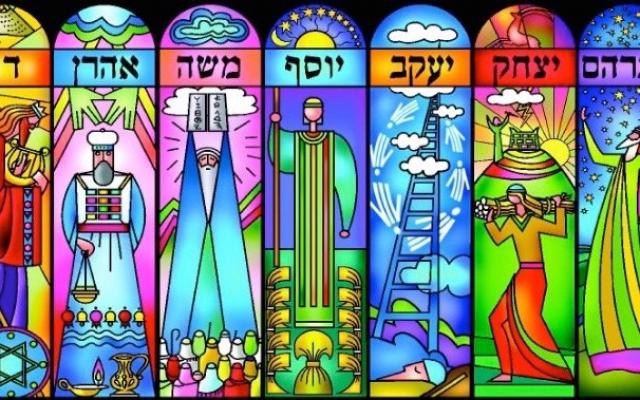
Seven Guests
Sukkah generates an intense concentration of spiritual energy. During Sukkot the souls of the seven great leaders of Israel –Abraham, Isaac, Jacob, Moses, Aaron, Joseph, and King David – actually leave Heavenly realm to partake in the Divine Light of Sukkot. Collectively these transcendent guests are known as Ushpizin, the Aramaic word meaning “guests.”
Each of the seven Ushpizin correspond to a fundamental spiritual pathway through which the world is perfected
· Abraham represents love and kindness
· Isaac represents restraint and personal strength
· Jacob represents beauty and truth
· Moses represents eternality and dominance through Torah
· Aaron represents empathy and receptivity to divine splendor
· Joseph represents holiness and the spiritual foundation
· David represents the establishment of the kingdom of Heaven on Earth We can connect to these energies and learn from our great leaders.
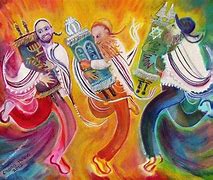
Simchat Torah
Sukkot is the only holiday that really encompasses two holidays: Seven days of Sukkot and 2 Days of Shemini Atzeret [upon which we celebrate Simchat Torah on the second day].
These final two days begin at sundown on October 6th 6:16pm (Philadelphia Time) until nightfall on October 8th. 7:11 pm (Philadelphia Time)
On this final day, it is customary to conclude and then immediately begin the annual cycle of Torah reading. The highlight of this holiday is the boisterous singing and dancing in the synagogue, as the Torah scrolls are paraded in circles around. Although the eighth day follows Sukkot, it is actually an independent holiday in many respects (we no longer take the Four Kinds or dwell in the sukkah). Jews outside of Israel still eat in the sukkah on the first of the two days of Shmini Atzeres.
The intermediate days (October 2, 3, 4,5 and 6th until sundown at 6:16 pm) are quasi holidays, known as Chol Hamoed. One is permitted to drive and use electricity but should still act in ways fitting for a Holiday.
Water and Joy
On Sukkot, G-d determines how much rain will fall that winter (the rainy season in Israel). Thus while every sacrifice in the Temple included wine libations poured over the altar, on Sukkot, water was also poured over the altar in a special ceremony. This ritual engendered such joy that it was celebrated with music, dancing and singing all night long. This celebration was called was “Simchat Beit Hasho’evah.”
Even today, when there is no Temple, it is customary to hold nightly celebrations that include singing and dancing (and even live music during the intermediate days of the holiday).
Inspirational Story
As we begin the New Year, we are humbled by the realization how dependent we are on our Creator.
As a young boy, Alex Clare had a unique knack for both composing and playing music. Even as a young sixteen-year-old, he performed as the drummer and backing vocalist of a band, where he remarkably excelled. But then something happened which got him thinking.
Sitting one day with his friends, Alex didn’t look too good. “I know I have a whole career ahead of me which includes a lot of money-making,” he remarked, “but suffice it to say, I am just not happy. I am looking for something more, and what I have now is not providing it.”
Alex, although far from Torah observance, appreciated and valued his Jewish heritage. And so, he began to learn more about Shabbos and kashrus and explore the meaning of Torah and mitzvos. It was the beginning of a riveting and life-altering journey, but something which Alex fully accepted and embraced.
At the same time, his career moved along and met tremendous success. At age 22, he signed a contract with Island Records, a Major record label. “But,” he told them, “I am an observant Jew and cannot play on Shabbos or other holidays.” Notwithstanding this condition, the label agreed to work with him. And so, things began to take off. Alex released his debut album – The Lateness of the Hour – which the label expected to be a big hit.
But, as it turned out, despite the tremendous investment spent on the record, it didn’t catch on as anticipated. The music was great, but Alex’s name was not well-known enough to attract a large clientele. Looking to augment Alex’s exposure to fans and the media, the label began making big plans for Alex.
But there was one problem.
In the music and concert world, Friday nights are important nights. But for Alex, they were important for a different reason: Shabbos. But, of course, his insistence on not performing then brought with it less opportunities to spread his name and fame, which his label wasn’t the happiest about. Especially when Alex had to turn down the offer to tour with Adele, a renowned English singer-songwriter, because it would conflict with Pesach, his label was especially disappointed. But, despite this all, Alex was still valued and someone they wished to accommodate.
But then Alex received a message one Saturday, which was also YomKippur. The label sounded very excited. Of course, Alex waited to listen to the message until after Shabbos, but when he did hear what it was about, he was quite surprised.
“You’re not going to believe this!” they said. “Live Lounge, a segment on the BBC radio station, told us that they had a cancellation and want you to play live! This will be in front of a national audience and be broadcasted over all of Europe. You will receive national coverage and have thousands of listeners. This is it! This is what we’ve been waiting for. The sales of your record will break through the roof!” Alex listened closely, although he knew that they were forgetting something very important which would nix the entire plan.
“And you won’t believe it! They want you to perform Thursday night! We were so scared it was going to be Friday night, but it’s not. This will be great… talk soon…” As Alex finished listening to the message, he took a seat. He couldn’t believe it for two reasons. For one, this would be the opportunity of a lifetime. It was this concert which would put him on board with other big performers and boost his career farther than he ever imagined. But he also couldn’t believe one other detail. Thursday night was the first night of [the Holiday of] Sukkos. He couldn’t perform.
Bravely picking up the phone a little while later, Alex called back and related the circumstances. “This is absurd!” the label stammered. “What do you mean you cannot do it? We already put up enough with you. If you cannot agree to perform this time, we will have no choice but to cut your contract!” Knowing that being released of his contract would result in being blacklisted all over and just about end his career, Alex felt as if the world was caving in.
But then he reminded himself of what he had learned the other day on YomKippur. He had read about the unwavering commitment of Rav Amnon of Mainz (author of U’Nesaneh Tokef, the liturgical poem recited on Rosh Hashanah and YomKippur), who had given up his life rather than renege on his Judaism. Inspiring Alex, he suggested that they look to reschedule to a different night. “I am terribly sorry,” Alex said, “but either we reschedule or I do not perform.” But the label wouldn’t hear of it.
And so, the contract was cut, leaving Alex in a trying and difficult predicament. On top of everything, he still had to repay the musicians he had hired to perform with him. Yet, he had no idea how he would ever do so. Aside from this, he had no means of paying his monthly rent.
Approaching his rabbi (Rabbi Dovid Tugendhaft of Nishmas Yisroel in London) for some guidance, Alex broke down. “Everything was going great until just recently. I was becoming more Torah observant and my career was going well. I was even able to work around performing on Shabbos. But, all of a sudden, this opportunity to perform in England came up and left me now penniless.” Looking empathetically at Alex, the rabbi reassured him. “You remind me of Avraham Avinu (Abraham our forefather). He was waiting and waiting for ninety-nine years to have a child, and then he was asked to sacrifice him. He was asked to give up his most precious and beloved son. You too, at your moment of greatness, gave up everything. But, somewhere hidden in this story, there is blessing to be found.”
Alex went on to move to Jerusalem and study in a yeshiva where he could grow in his knowledge and breadth of Torah. By now, Alex had come to terms with his situation. He in no way regretted making the decision to refrain from playing on Shabbos and holidays and bearing the subsequent consequences. Now, life was different, yet meaningful. He had finally found that purpose he had been searching after for many years.
But then the unexpected happened.
One day, Alex received a call from Microsoft. Although Alex had been blacklisted and out of contact with anyone for months, Microsoft had finally tracked him down. They wanted to use his first hit “Too Close” as the soundtrack for an ad launching the new version of Internet Explorer 9. “Could we do so?” they asked. Sure enough, Alex agreed.
The next thing Alex knew, the song was literally all over the world. It was being played on television worldwide and picking up enormous traction. It became the number one hit in Germany, number four on the UK Singles Chart, number seven in the US and received 45 million views on YouTube. And his debut album, which had previously flopped, now sold over six million copies.
And that is the story of Alex Clare.
It is much easier said than done, but here was someone who was not only ready to give up everything for Shabbos and Yiddishkeit, but actually did. And without question, Hashem (G-d) handsomely paid him back. The renown he was ready to give up forever came back to him. But this time, it was even greater than before. He was not merely spreading his own name; he was spreading Hashem’s name in the profoundest of ways and making a grand Kiddush Hashem (sanctification of G-d’s name). (From Rabbi Fischel Schachter www.TorahAnytime.com)
For my Short Russian video on the Holiday, please visit http://youtu.be/czN9RjqG2gI
For a 2 minute video of Sukkot please visit: https://www.youtube.com/watch?v=MoTMrJ8yUWM&feature=youtu.be
For more information visit: What Is Sukkot? – A Guide to the Jewish Holiday of Sukkot, the Feast of Tabernacles, and the Meanings Behind It – Chabad.org

